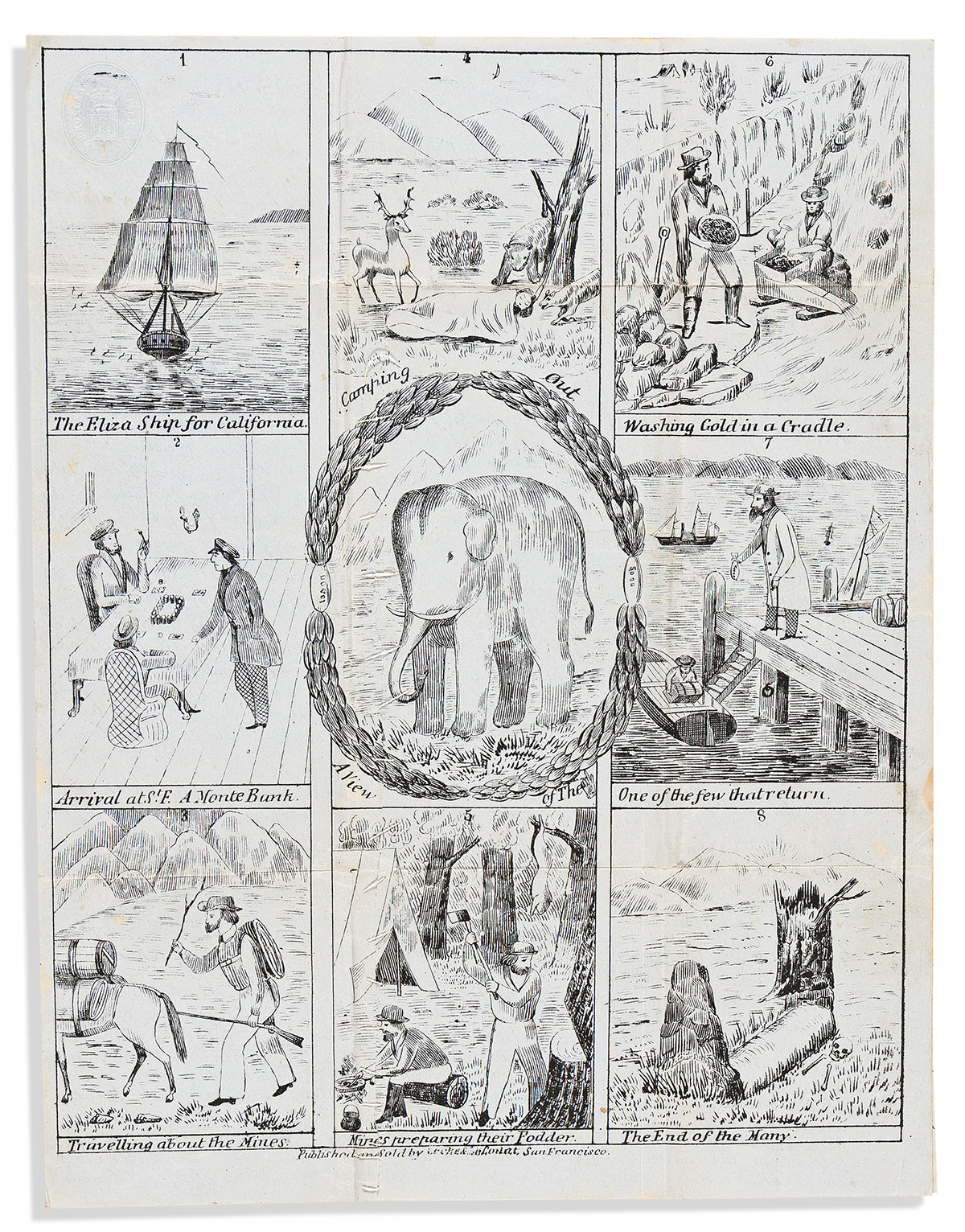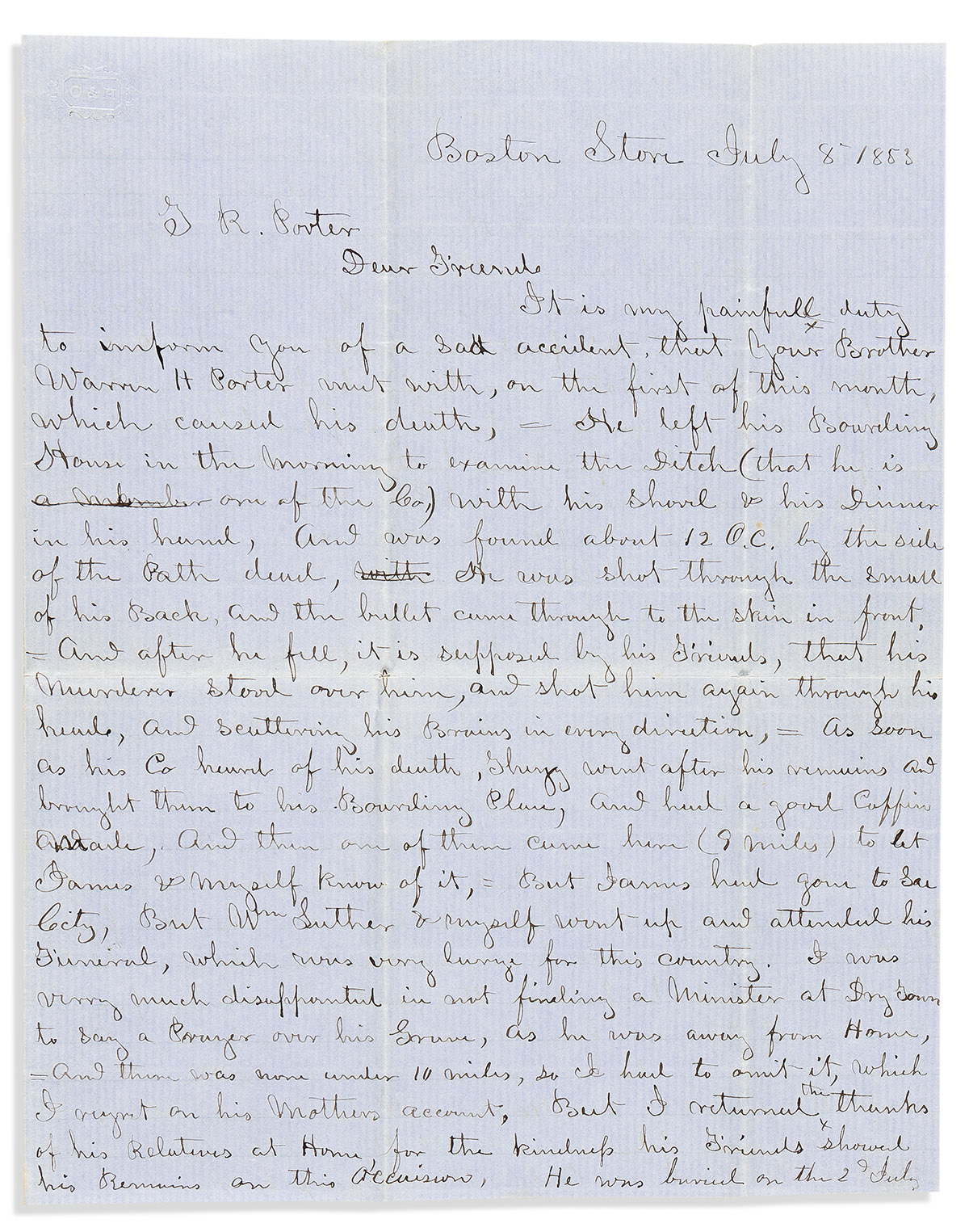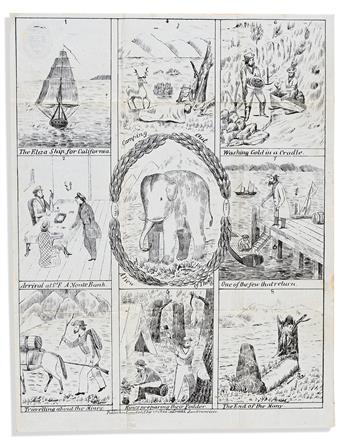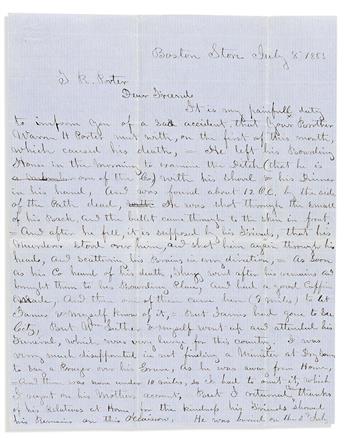Sale 2687 - Lot 48
Unsold
Estimate: $ 15,000 - $ 25,000
(CALIFORNIA.) Letters of Gold Rush miner Warren H. Porter, with the report of his fatal shooting by an outlaw. 17 items sleeved in one binder, including 13 Autograph Letters Signed from Warren Porter to his wife, mother, and siblings, plus 3 later letters, and a ledger page relating to his estate; condition generally strong. Various places, 1850-1855
Additional Details
Of all the sad stories in the California gold fields, Warren Porter's was sadder than most. He went west in April 1850, and was senselessly murdered in 1853.
Warren H. Porter (1808-1853) and his wife Martha Maynard Porter (1820-1886) were born and raised in western New York. Their daughter Alice was born in Syracuse in 1848, and soon after they moved to Sheboygan, Wisconsin, where he worked as a sawyer. By April 1850, he was en route to the gold fields.
The first letter is dated from Panama on 3 May 1850, with Porter crowded among 3000 other Americans awaiting transportation northward. He reported that "an American had shot a native without provocation & he was lying dead but a few feet from the shore canoe . . . because the native would not take him off in his canoe & the man was drunk. . . . The difficulty always resulted from the Americans going armed as tho they were among tigers." The next week, still in Panama, he reported that a fight broke out with the locals; a dissolute barkeep named "Somers while stooping to pick up a stone was knocked down by a stone on the head & stabbed, the knife entering the breast & passing through him. He told his name & residence, called for help, was caught by one of our Co., Pomeroy, & died. . . . The Consul urged them to avoid excitement & advised them to take the corpse to the tavern. . . . The natives have no firearms (or very few at least) & all their execution has been by stones; or in a close fight, with knives."
A letter begun on 11 August 1850 continues through September, describing his arrival in San Francisco and his journey upstream to "mines near Kelsys Bar on middle fork of Am. River, say 60 miles above Sacramento City." There he was disappointed: "The fact is the mines are exhausted---that is, the river bars & diggings have been turned over & over. . . . The majority of the miners are crevising, as it is called, i.e. digging the sand & dirt from the cracks & crevices of the rocks & washing it. When they find a place not touched they make sometimes a good haul. . . . Very few are getting rich fast. . . . A bed in the turf in front of your house would be luxuriously soft. Mine is a hard pan resembling the chips of a stone mason, plentifully sprinkled with dust, gravel & sand, but I sleep soundly. . . . My house is wherever my blankets are."
Porter's next letter was an epic 44-page effort written in a snazzy string-bound "Miners' and Travellers' Pocket Letter Book" with gilt-printed black glossy wrappers. Writing from "Hangtown" (soon to become Placerville) in January and February 1851, he reports that he has worked for a couple of days as a foreman on a road-planking crew, but "all my dreams of acquiring a fortune in a few weeks, without any means for making money, are fled; unless by accident I stumble on diggings richer than 1 in 10,000 find."
His 23 March 1851 letter from Hangtown is written on an attractive 9-panel engraved mining lettersheet by Cooke & LeCount of San Francisco, with the first panel reading "The Eliza Ship for California" and the center panel showing a "A View of the [Elephant]." The last two panels: "One of the Few that Return" and, ominously, a crude grave captioned "The End of Many." The hope had not been entirely beaten out of Porter; he was making grand plans to work a new river bar with some partners, and hoped that the money would be flowing homeward soon. He discourages the idea of his family settling in Hangtown: "I would not have Alice brought up in California for all the gold in it, hardly, unless society improves greatly."
Porter's remaining letters trace his moves from Placerville to "D.M. Hollow" to Indian Creek to Jameson's Ranch on the Cosumnes River, looking for a big score. On 23 May 1852 he described a partnership in a joint stock corporation to create a water company and dig a massive ditch: "We expect to finish it in 3 months & it will require all my means & work---for this reason I can make you no remittance at present; if it fails I lose another season." In his final letter on 23 January 1853, he reported: "The ditch is unfinished & therefore there is little demand for the stock."
The next letter is from one of Porter's associates, Henry Alvord, on 8 July 1853: "It is my painful duty to inform you of a sad accident. . . . He left his boarding house in the morning to examine the ditch (that he is one of the Co.) with his shovel & his dinner in his hand, and was found about 12 o'c. by the side of the path dead. He was shot through the small of his back, and the bullet came through the skin in front. And after he fell, it is supposed by his friends, that his murderer stood over him, and shot him again through his head, and scattering his brains in every direction." An accident, indeed. Porter had served as treasurer of the ditch company, and the murderer probably assumed he was flush with cash; he was not. Two others had been shot in the same area recently, but the highwayman had not yet been identified. Porter's friends had given him a decent burial "on a side hill," offered to place a fence around the grave, and planned to gather his humble effects for sale. Two more letters from James Alvord wrap up the details and include short news clippings on Porter's death. Finally, an October 1855 ledger page on the estate settlement shows that the water company stock has been sold for $1,126, and that $1,648 in cash had been sent home to Porter's heirs.
Warren H. Porter (1808-1853) and his wife Martha Maynard Porter (1820-1886) were born and raised in western New York. Their daughter Alice was born in Syracuse in 1848, and soon after they moved to Sheboygan, Wisconsin, where he worked as a sawyer. By April 1850, he was en route to the gold fields.
The first letter is dated from Panama on 3 May 1850, with Porter crowded among 3000 other Americans awaiting transportation northward. He reported that "an American had shot a native without provocation & he was lying dead but a few feet from the shore canoe . . . because the native would not take him off in his canoe & the man was drunk. . . . The difficulty always resulted from the Americans going armed as tho they were among tigers." The next week, still in Panama, he reported that a fight broke out with the locals; a dissolute barkeep named "Somers while stooping to pick up a stone was knocked down by a stone on the head & stabbed, the knife entering the breast & passing through him. He told his name & residence, called for help, was caught by one of our Co., Pomeroy, & died. . . . The Consul urged them to avoid excitement & advised them to take the corpse to the tavern. . . . The natives have no firearms (or very few at least) & all their execution has been by stones; or in a close fight, with knives."
A letter begun on 11 August 1850 continues through September, describing his arrival in San Francisco and his journey upstream to "mines near Kelsys Bar on middle fork of Am. River, say 60 miles above Sacramento City." There he was disappointed: "The fact is the mines are exhausted---that is, the river bars & diggings have been turned over & over. . . . The majority of the miners are crevising, as it is called, i.e. digging the sand & dirt from the cracks & crevices of the rocks & washing it. When they find a place not touched they make sometimes a good haul. . . . Very few are getting rich fast. . . . A bed in the turf in front of your house would be luxuriously soft. Mine is a hard pan resembling the chips of a stone mason, plentifully sprinkled with dust, gravel & sand, but I sleep soundly. . . . My house is wherever my blankets are."
Porter's next letter was an epic 44-page effort written in a snazzy string-bound "Miners' and Travellers' Pocket Letter Book" with gilt-printed black glossy wrappers. Writing from "Hangtown" (soon to become Placerville) in January and February 1851, he reports that he has worked for a couple of days as a foreman on a road-planking crew, but "all my dreams of acquiring a fortune in a few weeks, without any means for making money, are fled; unless by accident I stumble on diggings richer than 1 in 10,000 find."
His 23 March 1851 letter from Hangtown is written on an attractive 9-panel engraved mining lettersheet by Cooke & LeCount of San Francisco, with the first panel reading "The Eliza Ship for California" and the center panel showing a "A View of the [Elephant]." The last two panels: "One of the Few that Return" and, ominously, a crude grave captioned "The End of Many." The hope had not been entirely beaten out of Porter; he was making grand plans to work a new river bar with some partners, and hoped that the money would be flowing homeward soon. He discourages the idea of his family settling in Hangtown: "I would not have Alice brought up in California for all the gold in it, hardly, unless society improves greatly."
Porter's remaining letters trace his moves from Placerville to "D.M. Hollow" to Indian Creek to Jameson's Ranch on the Cosumnes River, looking for a big score. On 23 May 1852 he described a partnership in a joint stock corporation to create a water company and dig a massive ditch: "We expect to finish it in 3 months & it will require all my means & work---for this reason I can make you no remittance at present; if it fails I lose another season." In his final letter on 23 January 1853, he reported: "The ditch is unfinished & therefore there is little demand for the stock."
The next letter is from one of Porter's associates, Henry Alvord, on 8 July 1853: "It is my painful duty to inform you of a sad accident. . . . He left his boarding house in the morning to examine the ditch (that he is one of the Co.) with his shovel & his dinner in his hand, and was found about 12 o'c. by the side of the path dead. He was shot through the small of his back, and the bullet came through the skin in front. And after he fell, it is supposed by his friends, that his murderer stood over him, and shot him again through his head, and scattering his brains in every direction." An accident, indeed. Porter had served as treasurer of the ditch company, and the murderer probably assumed he was flush with cash; he was not. Two others had been shot in the same area recently, but the highwayman had not yet been identified. Porter's friends had given him a decent burial "on a side hill," offered to place a fence around the grave, and planned to gather his humble effects for sale. Two more letters from James Alvord wrap up the details and include short news clippings on Porter's death. Finally, an October 1855 ledger page on the estate settlement shows that the water company stock has been sold for $1,126, and that $1,648 in cash had been sent home to Porter's heirs.
Exhibition Hours
Exhibition Hours
Aliquam vulputate ornare congue. Vestibulum maximus, libero in placerat faucibus, risus nisl molestie massa, ut maximus metus lectus vel lorem.






